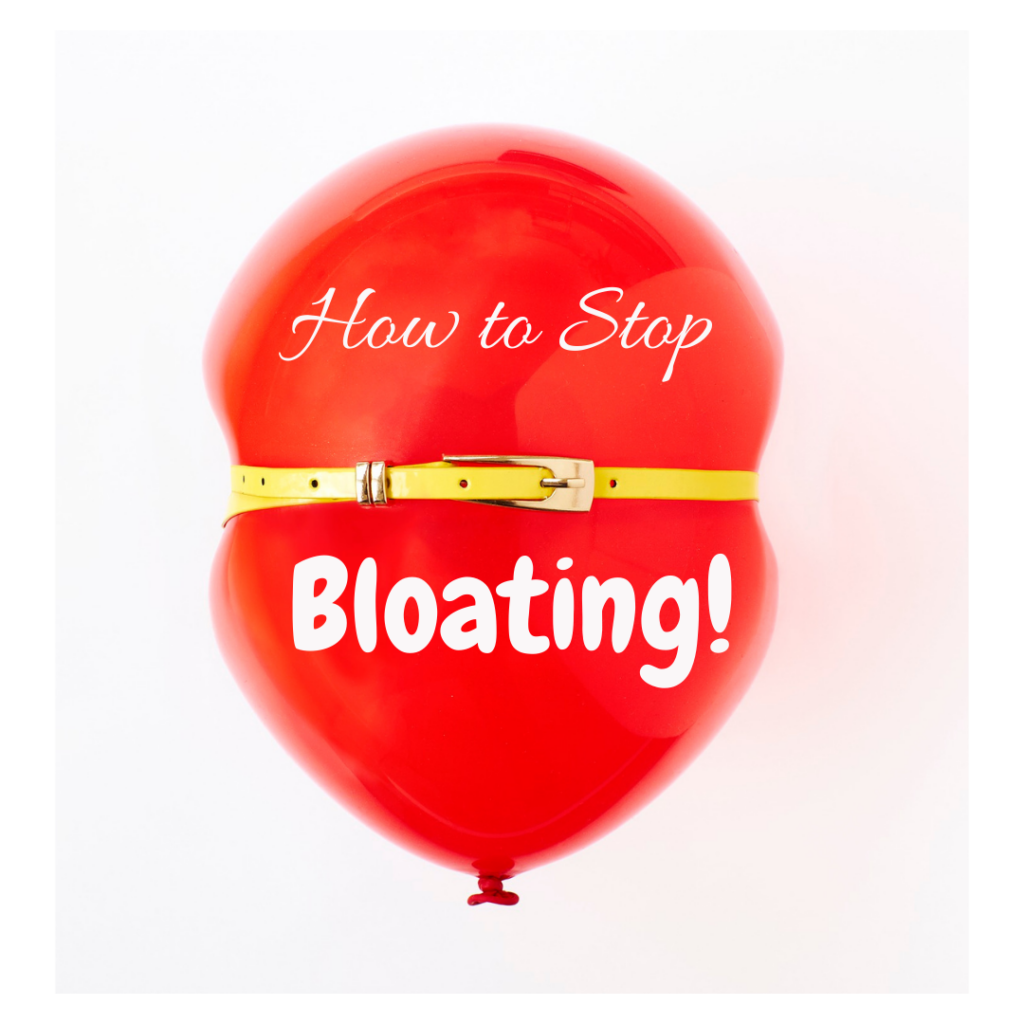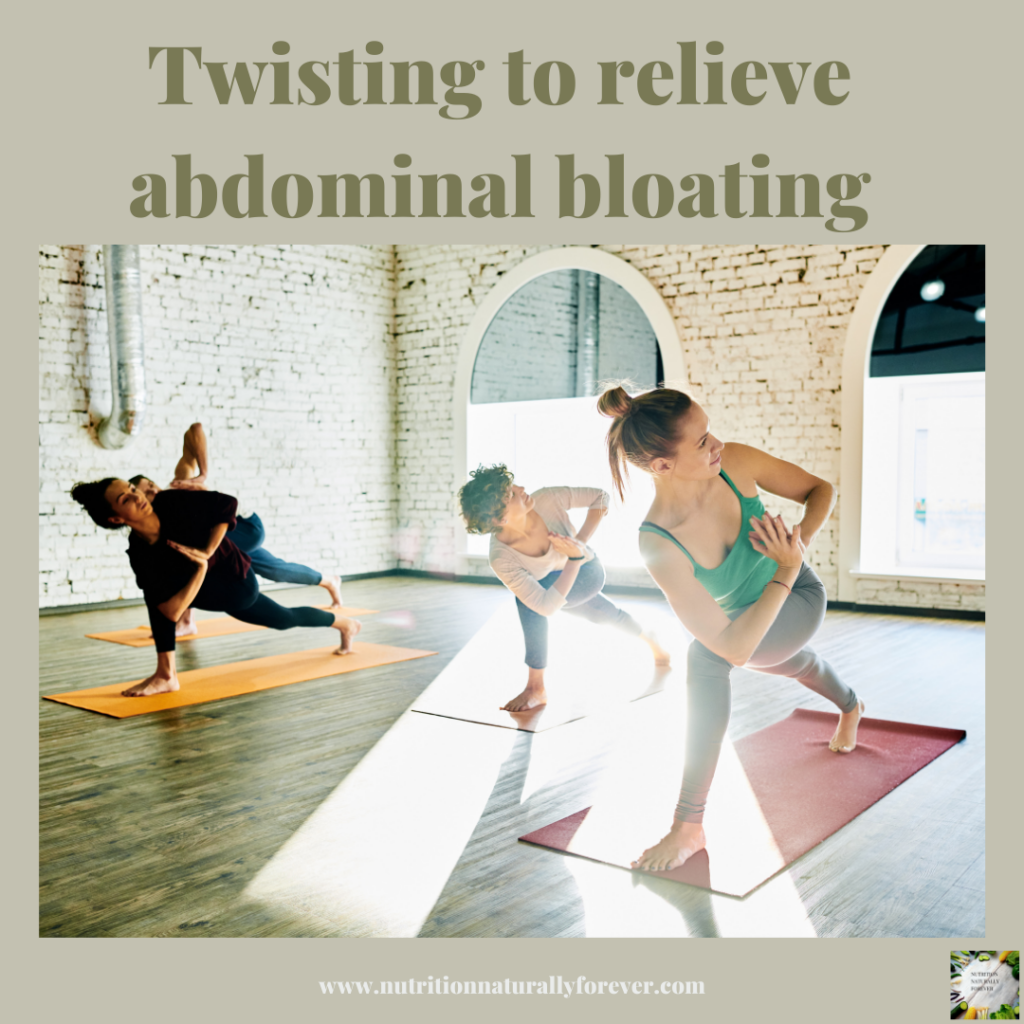
How to Stop Bloating!
Bloating can make your tummy feel full, tight, stretched, puffy or uncomfortable sometimes even painful. How can we stop it…?
What Causes Bloating?
Gas and air build up are the most common causes of bloating.
Gas can build up in the digestive tract through undigested food and, Air, by swallowing too much when we eat or drink.
We all take in air as we consume food and beverages but excess air can be caused by doing this too quickly.
The build up of gas can be caused by
- Too much or too little good bacteria
- Food intolerance
- Hormonal changes – fluctuations in Estrogen and Progesterone through menopause
- Stress/Anxiety/Depression – via the gut-brain axis
NOTE – Whilst most causes of bloating are down to our lifestyle choices, although annoying and uncomfortable, can be improved and relieved, bloating can also be an indication of something more serious. If bloating persists or is consistent for instance 12 times in a month it is always best to seek medical attention for an early diagnosis or to put your mind at rest.
How to Stop Bloating Naturally
By making small and sustainable changes to our routines and making them a habit we can improve our overall health and wellness and reduce bloating naturally.
I breakdown health and wellness into four areas, pillars, to make it easier to implement into daily life.
Try adding an element of each to your daily routine and note improvements you feel. Once these have become a habit, add more.
Pillar One – Nutrition
Reducing the consumption of fizzy drinks and chewing gum are the first changes I would suggest for immediate bloating relief.
Do you find you feel more bloated after a certain food? Consider eliminating this for a few days before reintroducing and noticing the effects, you may want to do this with the support of a professional.
Would you benefit from eating smaller meals more regularly rather than meals which may be too big and leave you feeling uncomfortable.
Improving gut health will definitely help reduce bloating. Adding probiotic supplements or probiotic foods will increase healthy bacteria and improve your gut flora. You can read more about which foods in a previous blog post, Gut Health, How to Improve it.
Do you have enough fibre in your diet? Once you have populated your digestive tract with healthy bacteria, you need to feed them. Do this by adding whole grains and whole fruits and vegetables gradually to your diet. Too much fibre too quickly will have a bloating effect until you are used to it.
Potassium can help balance the effect of sodium in your body. Sodium can increase fluid retention which will add to the feeling of bloating. Good sources of potassium are:
- Dried fruit
- Nuts
- Bananas
- Melon
- Rasperies
- Oranges
Studies have shown Peppermint relaxes the gut and may help relieve intestinal spasms. Peppermint tea contributes to better digestion so makes the perfect post meal beverage.
Pillar Two – Excercise
Gentle movement can help increase movement in your digestive tract.
Try walking, especially after a big meal.
Yoga poses such as twisting can help rinse and cleanse your system. Twists will increase blood flow to the area and stimulate your digestive tract. For a demonstration of these poses check out this link.
If you want to do something a little more vigorous anything that makes you sweat will help eliminate sodium from you body and reduce fluid retention.

Pillar Three – R&R
Taking time to increase Rest & Relaxation in your routine will improve digestive issues which can aggravate bloating.
When we are stressed our digestion slows down as our energy resources are redirected. You may find you become constipated as your digestion slows or you may have the opposite problem which can remove essential nutrients from your system.
Find different techniques to deal with a situation that regularly cause you stress. Taking a few minutes out to practise a calming visualisation or using Diaphragmatic/Abdominal breathing techniques may offer relief.
Using massage in your abdominal area, especially with some peppermint oil may also help to relax your intestines and expel some air.
Pillar Four – Spirit/Emotion
Pillar four goes a little deeper into self-care than most people delve but it is here that we can experience a lightbulb moment that can impact the other areas of our life.
Try using a journal to track your symptoms. If you end up visiting your GP this will provide valuable information to help your diagnosis.
Use your journal to note how your body feels daily along with details of your menstrual cycle. Make a note of any actions or remedies you take and how they have affected you.
Many women find that they are bloated around the time of ovulation. If you are journeying through menopause and your periods are irregular, tracking these symptoms will help you pin point when your period may be due.
If you are experiencing stress due to bottled up feelings you can try to express and release these in a journal, remember the words don’t need to be seen by anyone but you, it could certainly help you find some peace.
Bloating or Weight gain?
Menopause can cause rapid weight gain and bloating, how do you know the difference?
Bloating will cause the stomach to change size throughout the day, this won’t happen if you are experiencing weight gain.
If you are struggling with unwanted weight gain, learning to eat intuitively to balance your hormone levels and keep your metabolism firing effectively will enable you to reverse this effect.
Arrange a virtual cuppa and a chat with me to discuss your unique concerns and how I can support you to achieve your health goals.
If you aren’t receiving my blog posts into your inbox each week, subscribe in the box to your right.
Have you joined my Facebook community yet? Each week I share a challenge, information on ingredients, recipes, motivation and more, come and join us!
